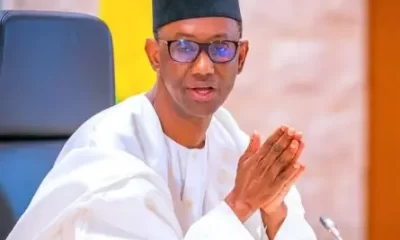National Issues
Fuel Crises In Nigeria -By Erejuwa Jessica
Nigeria’s fuel crisis requires immediate attention and action. The government, stakeholders, and international community must work together to address the underlying issues and implement long-term solutions. By doing so, Nigeria can overcome this crisis and ensure a more stable and prosperous future for its citizens. The government must also take steps to improve the country’s energy efficiency, promote sustainable energy practices, and encourage private sector investment in the energy sector.

Since late 2023, Nigeria has been grappling with a severe fuel crisis that has brought the nation to its knees. The crisis, which began in October 2023, has seen fuel scarcity, long queues, and skyrocketing prices, leaving millions of Nigerians stranded and frustrated. The situation has been described as catastrophic, with many calling it a ticking time bomb that threatens the country’s economic and social stability.
Nigeria, Africa’s largest oil producer, has a history of fuel crises due to its reliance on imported fuel and inadequate refining capacity. The country’s refineries have been in a state of disrepair, unable to meet the nation’s fuel demands. This has resulted in a vicious cycle of scarcity, price hikes, and hardship for the masses.
The current crisis has been exacerbated by a combination of factors, including a shortage of foreign exchange to import fuel, the shutdown of the country’s refineries for maintenance, a strike by oil marketers over unpaid debt, and a surge in demand due to the festive season. These factors have created a perfect storm that has pushed the country to the brink. The stakeholders involved in the crisis include the Nigerian government, led by President Bola Tinubu, the Ministry of Petroleum Resources, the Nigerian National Petroleum Corporation (NNPC), oil marketers, and transporters. These stakeholders must work together to find a lasting solution to the crisis. The fuel crisis is affecting the entire country, with major cities like Lagos, Abuja, and Port Harcourt being the worst hit. The crisis has had a devastating impact on Nigeria’s economy and citizens, leading to long queues and waiting times, skyrocketing prices, shortages of food and other essential goods, increased transportation costs, and loss of productivity and economic activity.
The international community has expressed concern over Nigeria’s fuel crisis, with some countries offering support and assistance. The African Union has called for urgent action to address the crisis, while the International Monetary Fund (IMF) has offered economic advice to the Nigerian government. To address the crisis, the government must take immediate and comprehensive action. This includes addressing the underlying issues, such as refining capacity and foreign exchange shortages, implementing policies to reduce the country’s reliance on imported fuel, investing in alternative energy sources, and providing support to citizens and businesses affected by the crisis. Furthermore, the government must take steps to address the issue of corruption, which has been a major contributor to the crisis. This includes ensuring transparency in the fuel subsidy regime, tackling oil theft and pipeline vandalism, and ensuring that those responsible for the crisis are held accountable. In addition, the government must work to improve the country’s infrastructure, including roads and transportation networks, to reduce the burden on citizens and businesses. This will help to reduce the economic impact of the crisis and ensure that the country is better prepared to handle future crises.
The international community must also continue to offer support and assistance to help Nigeria overcome this challenging period. This can include providing economic aid and expertise, sharing best practices in energy management, and supporting Nigeria’s efforts to diversify its energy sources. Moreover, the government must prioritize the development of alternative energy sources, such as solar and wind power, to reduce the country’s reliance on fossil fuels. This will not only help to address the current crisis but also ensure a sustainable energy future for the country.
In conclusion, Nigeria’s fuel crisis requires immediate attention and action. The government, stakeholders, and international community must work together to address the underlying issues and implement long-term solutions. By doing so, Nigeria can overcome this crisis and ensure a more stable and prosperous future for its citizens. The government must also take steps to improve the country’s energy efficiency, promote sustainable energy practices, and encourage private sector investment in the energy sector. This will help to create a more resilient energy system that can meet the country’s growing energy demands.










